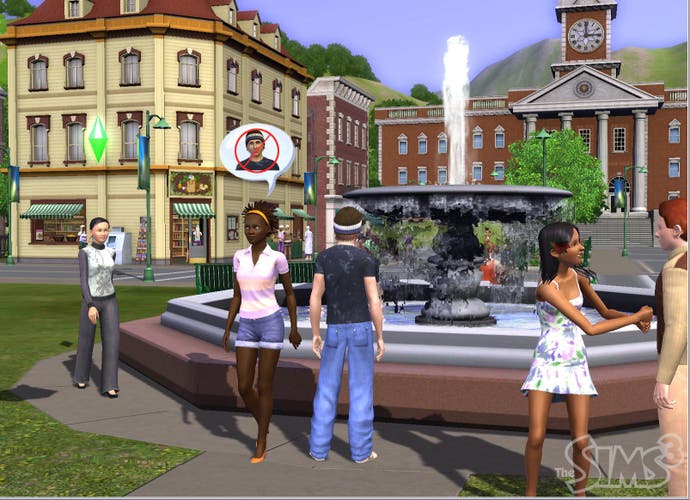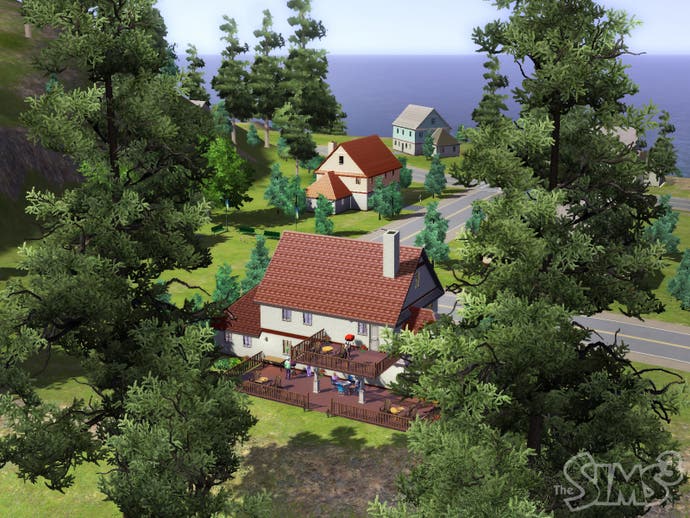The Sims 3
Go outside and play.
On a warm spring afternoon in EA's sprawling San Francisco Bay campus, the Sims is described as many things. It's a commercial phenomenon; it's the PC's most successful game; it's second only to Mario as the world's top-selling game series. It's a business unit; it's a business model. It's a creative tool; it's a canvas for the player's imagination. It's a private form of self-expression. It's a community. As you may remember, The Sims is also a game - one of the most popular, successful and, yes, innovative games in history.
However, it is all of those other things, too, which is part of why The Sims 3 is interesting; EA has spent five years since the launch of The Sims 2 watching and learning, seeing the game's proactive community churn out user-created content ranging from mods to videos. There are 100,000 videos on YouTube made using The Sims 2, and they've racked up 200 million views. Four million users visit EA's community site every month, and they've downloaded 60 million pieces of user-created content. Ford built some car models for the game, and 1.8 million people downloaded them. Pop-stars like Natasha Bedingfield have even re-recorded their songs in Simlish.
To an outsider, it all looks weird as hell - and simultaneously extraordinary, fascinating and progressive. "Where next?" is an obvious question, and no less exciting for it. The second reason why The Sims 3 is interesting is summed up by executive producer Ben Bell: "Imagine if your whole life took place in one apartment, or one house, with one small back yard," he says. "Now imagine how your life would change if all of a sudden you could explore the neighbourhood outside your back door - if, all of a sudden, one day, someone came and opened that door."
Door wide open

Unlike The Sims 2, which faked the concept of having an entire neighbourhood by basically loading up a new household every time you moved around, The Sims 3 takes advantage of five years' technology progress by offering an open world - an entire town in which everything is actually there, actually happening, all the time. This changes the game in a fundamental way. Before, you managed a household of Sims, but now an overview of an entire town - filled with households of Sims, each of whom has a life as complex as any of your own characters - is only a roll of the mousewheel away. Characters, whether they're your own Sims or your neighbours, no longer disappear when you're not looking at them - when they go off to work, for instance, you can follow them as they hop into their cars and drive across town. Then you might track their progress at work like you do at home - or zoom out again and fly back across town to do something else.
It's a headline feature, and it's a very clever way to use the modern PC's extra horsepower. Graphically The Sims 3 is a cut above its predecessor, but it's no BioShock. "We're not in an arms race with other games," explains Sims studio boss Rod Humble. Using the PC's grunt to model a bigger world with more complex interactions means more to Sims fans than having bump-mapped, specular-highlighted, soft-shadowed bathroom furniture in their virtual houses. There's another subtext here, too. In a game where user-created content is a major driving force, the bar needs to be low enough that every able creator can create.

Even after seeing Ben Bell zoom around the rolling hills and idyllic streets of a typical Sims town, though, the potential of The Sims 3's expanded scope doesn't really hit home. It's not until later in the afternoon, when Humble shows us some prototypes that explain what's happening under the hood, that everything clicks into place. In simple 2D graphics, we watch as an entire town of people moves around, each going about their routine, interacting with others and living lives according to their personalities, careers and so on. It's a vast, complex simulation of a community, at this scale looking more like a sociology project than anything.
Later, we see an even higher-level simulation - a screen full of "life stories", characters being born, growing up, entering and leaving careers, getting married, having children, getting rich or becoming destitute, dying and being succeeded by children whose own lives proceed through the cycle. As you play, The Sims 3 remembers all of these life stories. It's like an author who works out an intricate back-story before writing a book; the player will only experience a slice of the information, but the fact that it's all been worked out saves us from inconsistency. This made-up town is real, for want of a better expression.


